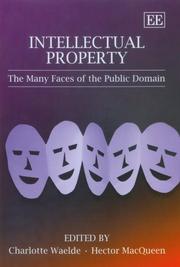| Listing 1 - 3 of 3 |
Sort by
|

ISBN: 9781845428747 1845428749 Year: 2007 Publisher: Cheltenham: Elgar,
Abstract | Keywords | Export | Availability | Bookmark
 Loading...
Loading...Choose an application
- Reference Manager
- EndNote
- RefWorks (Direct export to RefWorks)
As technological progress marches on, so anxiety over the shape of the public domain is likely to continue if not increase. This collection helps to define the boundaries within which the debate over the shape of law and policy should take place. From historical analysis to discussion of contemporary developments, the importance of the public domain in its cultural and scientific contexts is explored by lawyers, scientists, economists, librarians, journalists and entrepreneurs. The contributions will both deepen and enliven the reader's understanding of the public domain in its many guises, and will also serve to highlight the public domain's key role in innovation. This book will appeal not only to students and researchers coming from a variety of fields, but also to policy-makers in the IP field and those more generally interested in the public domain, as well as those more directly involved in the current movements towards open access, open science and open source.
Intellectual property --- Public domain (Copyright law) --- Technological innovations --- Philosophy --- Law and legislation --- Copyright --- IP (Intellectual property) --- Proprietary rights --- Rights, Proprietary --- Intangible property --- Public domain --- Technological innovations Law and legislation --- Intellectual property - Philosophy --- Technological innovations - Law and legislation
Book
ISBN: 0674049489 0674061128 9780674061125 9780674049482 0674266080 Year: 2011 Publisher: Cambridge, MA : Harvard University Press,
Abstract | Keywords | Export | Availability | Bookmark
 Loading...
Loading...Choose an application
- Reference Manager
- EndNote
- RefWorks (Direct export to RefWorks)
Why should a property interest exist in an intangible item? In recent years, arguments over intellectual property have often divided proponents-who emphasize the importance of providing incentives for producers of creative works- from skeptics who emphasize the need for free and open access to knowledge.In a wide-ranging and ambitious analysis, Robert P. Merges establishes a sophisticated rationale for the most vital form of modern property: IP rights. His insightful new book answers the many critics who contend that these rights are inefficient, unfair, and theoretically incoherent. But Merges' vigorous defense of IP is also a call for appropriate legal constraints and boundaries: IP rights are real, but they come with real limits.Drawing on Kant, Locke, and Rawls as well as contemporary scholars, Merges crafts an original theory to explain why IP rights make sense as a reward for effort and as a way to encourage individuals to strive. He also provides a novel explanation of why awarding IP rights to creative people is fair for everyone else in society, by contributing to a just distribution of resources. Merges argues convincingly that IP rights are based on a solid ethical foundation, and-when subject to fair limits-these rights are an indispensable part of a well-functioning society.
LAW --- Intellectual Property / General --- Intellectual property --- Intangible property --- Law, Politics & Government --- Law, General & Comparative --- Philosophy --- Intangible property. --- Philosophy. --- Incorporeal property --- Intangible assets --- Intangibles --- IP (Intellectual property) --- Proprietary rights --- Rights, Proprietary --- Law and legislation --- Property --- E-books --- Intellectual property - Philosophy --- Intangible property - Philosophy
Book
ISBN: 1139334336 110722988X 1280394080 9786613572004 1139337769 1139340212 1139341790 1139336894 1139338633 1139035363 9781139338639 1107014611 9781107014619 9781139336895 9781139035361 9781139340212 9781139340212 9781139334334 9781280394089 6613572004 9781139337762 9781139341790 9781107691773 110769177X Year: 2012 Publisher: Cambridge Cambridge University Press
Abstract | Keywords | Export | Availability | Bookmark
 Loading...
Loading...Choose an application
- Reference Manager
- EndNote
- RefWorks (Direct export to RefWorks)
What is 'intellectual property'? This book examines the way in which this important area of law is constructed by the legal system. It argues that intellectual property is a body of rules, created by the legal system, that regulate the documented forms of abstract objects, which are also defined into existence by the legal system. Intellectual property law thus constructs its own objects of regulation and it does so through the application of a collection of core concepts. By analyzing the metaphysical structure of intellectual property law and the concepts the legal system uses to construct 'intellectual property', the book sheds new light on the nature of this fascinating area of law. It explains anomalies between social and intellectual property uses of concepts such as authorship - here dubbed 'creatorship' - and originality and it helps to explain the role of intellectual property from a structural (rather than the traditional normative) perspective.
Intellectual property --- Law. --- Acts, Legislative --- Enactments, Legislative --- Laws (Statutes) --- Legislative acts --- Legislative enactments --- Jurisprudence --- Legislation --- IP (Intellectual property) --- Proprietary rights --- Rights, Proprietary --- Intangible property --- Philosophy. --- Law and legislation --- Philosophy --- E-books --- Law --- General and Others --- Intellectual property - Philosophy --- Australie --- Royaume-Uni --- Etats-Unis
| Listing 1 - 3 of 3 |
Sort by
|

 Search
Search Feedback
Feedback About UniCat
About UniCat  Help
Help News
News